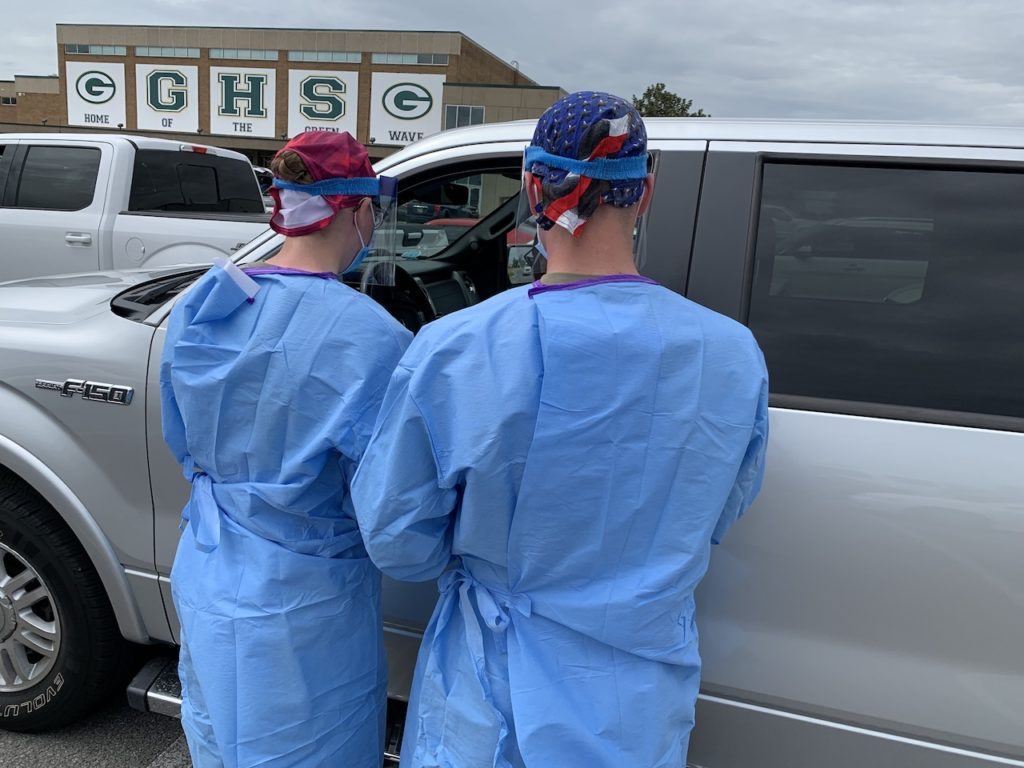
Tennessee has figured out one way to achieve widespread coronavirus testing — have the government pay for it. Ample testing capacity has been seen as a key benchmark in reopening businesses, and unlike most other states, Tennessee has more than it needs right now. A WPLN News investigation finds that a key reason is that Tennessee agreed to pay commercial labs directly and guarantee them a flood of business.
The directive in Tennessee has become strikingly simple. “When in doubt, get a test,” Gov. Bill Lee now says. And people are taking the state up on the offer, lining up in their cars each weekend.
“I said, I know there will be a long line but we’ll just sit and wait. We charged our tablets, and I’m doing sight words with the kids,” said Christine Garner of Hendersonville, as she waited in her minivan at Gallatin High School. More than 800 people were tested at that one site that Sunday afternoon.
Garner closes refinanced mortgages for a living, which puts her in close contact with multiple families a day. Still, she had no symptoms. And her closest contact to someone with COVID-19 was second-hand.
“I’m just hyper-sensitive to any change in my body at all. I think a lot of people are,” she said.
A WPLN investigation finds no other state is encouraging such broad symptom-free testing. That’s partly because of something Harvard researchers found in a state-by-state analysis published by STAT News. Almost no other state has so many tests to spare.
‘You’re About To Get A Flood Of Tests’
Tennessee Department of Health Commissioner Lisa Piercey gives credit to private, commercial labs.
“We’ve called on almost all of them to say, ‘we need you to ramp up because you’re about to get a flood of tests,’ and that’s exactly what we’ve given them,” she said at a briefing last week.
In the first weekend events, it was more than 11,000 tests.
But private labs are shouldering the testing load in most states. What’s relatively novel in Tennessee is that the state guaranteed payment to those companies.
So rather than making them bill various health insurance plans — which are required to cover COVID-19 testing, but still creates paperwork — the state is just picking up the tab. And the typical rate set by the federal government just doubled to $100 a swab. So that one weekend may result in paying lab companies more than a million dollars.
Memphis-based American Esoteric Laboratories has been processing the bulk of the state-collected swabs. The company declined to comment for this story.
Nashville-based Aegis Sciences jumped in more recently and is already doubling its capacity to 7,000 tests a day. CEO Frank Basile says the guaranteed payment was a big help.
“Clearly, it’s beneficial for the lab companies like us to receive the assurance of payment,” Basile says. “That’s definitely a positive. And it gives us the confidence to put the effort and the capital in to make this happen.”
And COVID-19 testing requires more investment right now because the swabs and chemicals necessary for testing are in such high demand.
‘Strikes Me As Very Smart Policy’
But the tax dollars are well spent, says Dr. Ashish Jha. He’s the director of the Harvard Global Health Institute and helped with the recent state-by-state comparison in testing capacity publish by STAT. He says Tennessee’s investment could more than pay for itself since ample testing capacity is seen a necessity to reopen businesses. Jha says he’s been recommending this approach to government officials across the country.
“If the state says they’ll just pay everybody $100 bucks every time you do a test, that strikes me as very smart policy,” he says.
Tennessee officials tell WPLN News they’re banking on being reimbursed by the federal government at some point.
Still, it does take having some cash to spare. The Tennessee Department of Health doesn’t know exactly how much it’s on the hook for yet. But it’s a tab that grows by hundreds of thousands of dollars some days. Aside from the weekend drive-thru events, the state is also paying to process the weekday testing being done by local health departments, including three drive-thru centers in Metro Nashville.
All this testing access is generally a good thing, says pandemic consultant Kelly Moore, formerly of the Tennessee Department of Health. She refers to the test takers as primarily “the worried well” since nearly 99 percent of them have tested negative.
“If these highly motivated, worried well people, coming out for free tests, are not taking up scarce resources we need for someone else, then it’s definitely not a problem to test them,” Moore says.
But Dr. Moore sees a potential downside. All those negative tests being mixed into a state’s total could mask spikes in new cases.
“We can’t draw conclusions about what’s going on in the whole community based on this self-selected group of people who are so motivated they come out to get tested,” she says.
As Tennessee has made testing a free-for-all, several isolated outbreaks have also resulted in some of the biggest daily jumps in cases yet.

